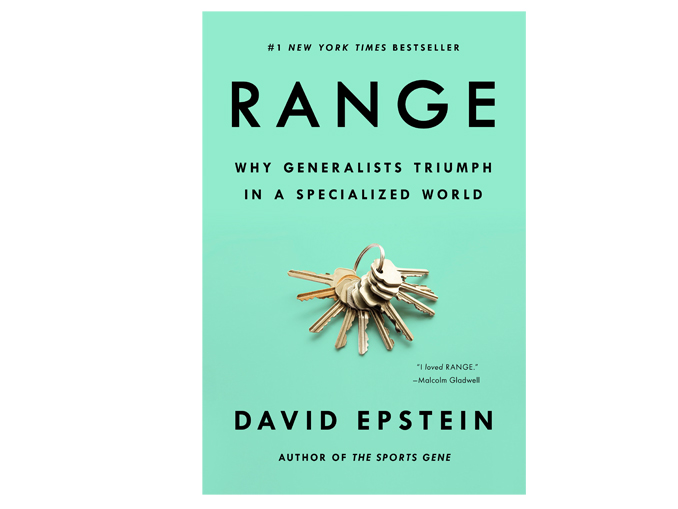Range: Why Generalists Triumph in a Specialized World by David Epstein, Riverhead Books, 2020
We live in a world where we are continuously bombarded with the message that in order to be most successful, one should specialize as soon as possible, with Tiger Woods, grand chess masters, and 10,000 hours of practice being given as frequent support to this specialization argument.
Epstein’s fascinating, extremely well-written and researched book will shatter many preconceived notions about the role of specialization. He shows that these three previous specialization lessons are built on misperceptions that lead many to the false conclusion that specialization is the primary path to success. While Epstein does identify specific examples in which specialization is a strength, these fall into the minority of cases. This finding was actually a surprise to the author. When he began thinking about writing a book on specialization versus generalization, he thought it would be balanced and he would use alternate chapters to focus on each. However, the more he researched, the more he uncovered that in many cases generalization is the path to success.
In Range, Epstein explains that many specialization jobs incorporate pattern recognition and fast, accurate feedback on actions, and are thus types of jobs where AI can be easily programmed to do those jobs. Chess is an example: a computer using AI can learn to beat any chess master. Epstein fills the book with myriad examples in which “the further the problem was from the solver’s expertise, the more likely they were to solve it.” Specialists suffered from the Einstellung Effect, a tendency of problem solvers to employ only familiar methods even if better ones are available.
The genesis of Range was at an MIT Sloan Sports Analytics Conference debate with fellow author Malcolm Gladwell. The topic was the benefit of focused intense practice and specialization in a sport at an early age. Gladwell took the pro side of the argument, and Epstein took the con side.
As Epstein dug deeper into a vast array of research, he discovered that delayed specialization was the norm in sports. In other words, the majority of athletes who were most successful tended to “undergo (a) sampling period. They play a variety of sports, usually in an unstructured or lightly-structured environment; they gain a range of physical proficiencies from which they can draw; they learn about their own abilities and proclivities; and only later do they focus in and ramp up technical practice on one area.” These athletes tended to have a wide generalist foundation that they could draw on. Roger Federer is an example of an athlete who did not specialize early, and therefore went through this sampling phase. Epstein also discovered that the 10,000 hours of practice was based on reviewing the hours that thirty world-class violinists practiced and that the 10,000 hours was an average, with some practicing much less and some much more.
As Epstein continued to explore other professions, he found that while specialists may be more successful for the first couple of years, in the long run those with strong generalist foundational backgrounds had greater long-term success.
His vivid ditch digging example helps explain why. Generalists are samplers who may not have deep, detailed knowledge of any one category; therefore, they can be seen as having dug many shallow ditches. The specialists have such focused knowledge that their ditch is deep. They can’t see over the sides, so can only search for answers within the confines of their deep ditch. Generalists, whose ditches are shallow, are able to look over and access the knowledge and experience from the vast array of ditches they have dug. Epstein points out that “highly credentialed experts can become so narrow-minded that they actually get worse with experience, even while becoming more confident—a dangerous combination.”
This review has only touched the surface of what Epstein writes about. Range is full of interesting discussions and vivid examples across a vast array of categories, that anyone, no matter their background or industry, should find relevant, possibly changing their current baseline assumptions and approaches to problem solving and skill building.


Be the first to comment